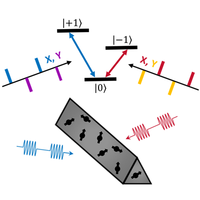交互式 Qudit 系统的稳健哈密顿工程
IF 11.6
1区 物理与天体物理
Q1 PHYSICS, MULTIDISCIPLINARY
引用次数: 0
摘要
动态解耦和哈密顿工程是用于控制量子比特系统的成熟技术。然而,由于缺乏布洛赫球表示、更复杂的相互作用和额外的控制约束,为比特系统设计相应的方法一直具有挑战性。通过识别与此类问题相关的几种一般结构,我们开发出了强相互作用四比特系统的鲁棒动态解耦和哈密顿工程的形式主义。我们的形式主义大大简化了奎迪特脉冲序列的设计,同时自然地纳入了实验实用性所必需的鲁棒性条件。我们在一个强相互作用、无序的自旋-1 氮空位中心集合体中实验演示了这些技术,与现有脉冲序列相比,相干时间提高了一个数量级以上。我们进一步描述了我们的技术如何实现量子多体疤痕等奇异多体现象的工程化,并为提高灵敏度的量子计量开辟了新的机遇。这些成果为多体物理学和量子计量学中的动态解耦和哈密顿工程提供了意义深远的新应用。本文章由计算机程序翻译,如有差异,请以英文原文为准。

Robust Hamiltonian Engineering for Interacting Qudit Systems
Dynamical decoupling and Hamiltonian engineering are well-established techniques that have been used to control qubit systems. However, designing the corresponding methods for qudit systems has been challenging due to the lack of a Bloch sphere representation, more complex interactions, and additional control constraints. By identifying several general structures associated with such problems, we develop a formalism for the robust dynamical decoupling and Hamiltonian engineering of strongly interacting qudit systems. Our formalism significantly simplifies qudit pulse-sequence design while naturally incorporating robustness conditions necessary for experimental practicality. We experimentally demonstrate these techniques in a strongly interacting, disordered ensemble of spin-1 nitrogen-vacancy centers, achieving more than an order-of-magnitude improvement in coherence time over existing pulse sequences. We further describe how our techniques enable the engineering of exotic many-body phenomena such as quantum many-body scars, and open up new opportunities for quantum metrology with enhanced sensitivities. These results enable wide-reaching new applications for dynamical decoupling and Hamiltonian engineering in many-body physics and quantum metrology.
求助全文
通过发布文献求助,成功后即可免费获取论文全文。
去求助
来源期刊

Physical Review X
PHYSICS, MULTIDISCIPLINARY-
CiteScore
24.60
自引率
1.60%
发文量
197
审稿时长
3 months
期刊介绍:
Physical Review X (PRX) stands as an exclusively online, fully open-access journal, emphasizing innovation, quality, and enduring impact in the scientific content it disseminates. Devoted to showcasing a curated selection of papers from pure, applied, and interdisciplinary physics, PRX aims to feature work with the potential to shape current and future research while leaving a lasting and profound impact in their respective fields. Encompassing the entire spectrum of physics subject areas, PRX places a special focus on groundbreaking interdisciplinary research with broad-reaching influence.
 求助内容:
求助内容: 应助结果提醒方式:
应助结果提醒方式:


